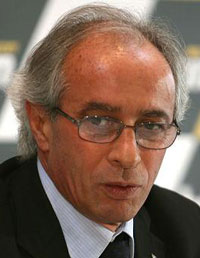FIM president Vito Ippolito has his say on the current state of motorcycle disciplines around the world including Road, Motocross, Supercross, Trials, Speedway and more.
Vito Ippolito has held the title of FIM president since 2006 after being elected in Brazil that October, working hard to boost motorcycling to new levels in his role since that time.
With a variety of objectives and disciplines to move forward during what has been a very difficult time in the Global Financial Crisis, the FIM sent out this interesting interview with Ippolito regarding the future of the sport.
Enjoy it right here on MotoOnline.com.au.
What conclusions can you draw after eight months of the 2009 season?
We were ready to go through 2009 with the world economic crisis in the background. During the last eight months we have been working in a close collaboration with all our promoters, manufacturers, sponsors, riders and all the participants in our sport as a whole.
We are well aware of what is going on in each discipline in order to put in place some valid solutions which can ensure the permanence of the championships. We are also trying to establish the guidelines to follow for the next ten years. We still have a lot of work to do before the end of the season but globally participation in terms of spectators and media coverage is very satisfactory.
Can you give some details about the situation in the Road Racing World Championships?
Two important decisions have been taken since the beginning of the year. The first one aims at reducing the costs in the MotoGP class. We had to modify some parts of the sporting and technical rules in agreement with the manufacturers and the teams.
We hope to be able to increase the number of riders in MotoGP as of 2011, while respecting the prototype concept of this championship. We should thus be able to introduce three or four additional riders on the starting grid of this class.
The second important decision regards the future of the 250cc class. Because of the withdrawal of most manufacturers and the disappearance of this class from national championships, the costs of participation have greatly increased. We had thus to create a new class – which will be called Moto2 – in order to replace it.
Although this period is economically tough, manufacturers have agreed to invest in new projects. The unique engine for Moto2 seems to us to be the best solution for significantly reducing the costs.
Concerning the FIM Superbike World Championship, it is necessary to reduce the costs for the teams as private sponsors might be less numerous and the manufacturers might be forced to reduce their investments. Consequently the number of riders and teams taking part in the championship might also be reduced next year; we must continue our work and take quick decisions.
Regarding the FIM Endurance Championship, for which the FIM itself is the promoter, we worked hard to improve this championship in a general way, its media coverage and the quality of the teams entered. Here again we have to continue in the same way and find how to reduce travel costs for teams travelling outside Europe.
What about the world championships in Motocross, Supermoto and Supercross?
In Motocross we have noticed a great improvement in media visibility. However, our greatest worry comes from the increase of participation costs for the teams. One must expect that some of the teams will face economic difficulties and that the number of entries will be lower as of next year. We are currently in discussions with the promoter in order to quickly find solutions to reduce these costs in 2010 and maintain the number of entries in this championship.
SuperMoto is still a recent discipline; this championship has not yet found its stability, mainly in terms of appropriate circuits and of spectators but also in terms of organisation. Unfortunately, the economic crisis comes at a very bad moment and is considerably slowing down its development.
Regarding Supercross, public attendance is very high but we are trying to find solutions to export this championship outside North America, in order to extend its media coverage and develop it at European and world levels.
Generally speaking, a presence of championships on various continents is something positive for their expansion. In times of crisis, cost reduction is not sufficient to solve all the problems. We have to find other arguments to motivate the sponsors and offer more attractive solutions. But the quality of the championships also depends on the riders’ participation in both championships.
An important target to improve the quality would be to have the top American riders take part in the FIM Motocross World Championship and on the other hand have the top European and “rest-of-the-world” riders take part in Supercross, in order to boost audience numbers and attract more sponsors. This is the case in the Motocross of Nations which gathers together twice as many spectators as a Motocross Grand Prix, offering the three best riders from about thirty different countries. This is a way to fight the crisis.
What do you think about the situation in Trial?
In the case of Trial, the work of our marketing and communications department has contributed to improve media coverage but the industry is suffering from a lowering market, which has an impact on these championships. We have consulted all the parties involved and we are currently working on important modifications of the technical and sporting rules. Moreover, we must continue our work with the national federation and the governments concerned in order to create spaces reserved for Trial riding.
And regarding Enduro?
In Enduro, our main objective is also globalisation. It is difficult to find tracks in Europe. The rounds organised outside Europe were really successful such as the one in Mexico. This means we are moving in the right direction.
How do you see the situation with the Cross-Country Rallies?
The Cross-Country Rallies are attracting more and more people but once again we have to find formulas to facilitate the participation of riders with appropriate machines. Moreover, we must absolutely find a viable solution to the never-ending problem of the calendar.
Speedway and Track Racing Championships are a bit different. How are they doing?
The FIM Individual Speedway World Championship Grand Prix is very successful in the countries where the grand prix are being held and we are globally satisfied with the participation of spectators and the TV broadcasting. However, it is now necessary to invest in the expansion and the globalisation of this championship and this discipline.
Contrary to other disciplines, the presence and support of traditional motorcycle manufacturers is non-existent. This is a very attractive and really spectacular discipline; we must find arguments and different methods, look for sponsors who are less linked to the machine and more to the public.
Concerning the defence of the interests of motorcyclists, in which the FIM plays an increasing role, is there anything new?
We are experts in motorcycling safety. The FIM is a world organisation so we must support the United Nations. Traffic casualties will exceed disease as the main cause of premature death in middle and low income countries in the next 25 years unless trends are reversed. They can be! It is not inevitable and millions of lives can be saved and injuries prevented.
FIM has received an invitation from the Russian government to attend an inter-ministerial conference on this in Moscow in November. That conference will develop a UN action plan and we will support it.
Together with environmental actions that the FIM has undertaken in recent years, the creation of a FIM Championship for electric motorcycles was recently announced for the 2010 season. Can you tell us more about this?
Indeed, the FIM as a federal organ of motorcycle sport must take into account current environmental problems. This is why, in the framework of our agreement with the United Nations Environmental Programme we put in place every year initiatives aiming at making the motorcycle world aware and reminding us of our duties towards our planet.
With the same goal and in order to promote new energies, the FIM has decided to create a FIM Championship for electric motorcycles that will be managed by the Road Racing Commission (CCR). The events will be held together with some rounds of the FIM Endurance World Championship as of 2010. It was following the TTXGP event, supported by the FIM and organized on the Isle of Man in June 2009, that this project was born.
A final comment?
Regarding our sport, I want to repeat that my main objective is to remain in permanent contact with and to listen to the promoters, teams, manufacturers and all the participants in our sport in order to find solutions to the problems that arise. This is, in my view, one of the essential roles of the FIM.









Newsletter